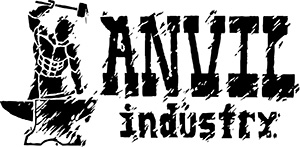Climate Policy
The Climate Crisis is a global challenge which will affect us all. At Anvil Industry we want to minimise our impact on the environment, whilst continuing to deliver high-quality products at an affordable price point.
Summary
What do we currently do?
Our office/manufacturing building was recently renovated to a high standard with insulation, heat pumps, heat recovery, and low-energy lighting.
All our postage materials are recyclable and/or compostable.
Product - made in the UK to order, not retail packaged, low waste manufacturing techniques.
Digital Forge - reduces the need to make and ship to customers. Less wastage.
Staff use public transport or bicycles to get to the studio, and also work from home where possible.
- The studio is powered by 100% renewable energy via our supplier Octopus Energy.
Aims
Net-zero by 2030.
Audit our carbon footprint and come up with a detailed plan by 2024.
Strategies
Work with net-zero suppliers.
Find low-carbon alternatives.
Train staff to further reduce energy consumption in our offices and manufacturing.
Further studio improvements planned including solar panels.
Detail
What do we currently do to reduce energy consumption and minimise waste?
All of our resin products are manufactured in the UK in our East London studio, this means we can control the energy and material use directly, as well as not have stock transported around the world on cargo ships. In addition, our raw materials are sourced from the UK and Europe.
We moved into our East London studio in 2019, it is a converted Victorian building and has been renovated to our own specifications - all of which help to reduce our energy consumption.
These include:
Insulation up to current building standards.
Mechanical Heat Recovery Ventilation.
Triple-glazed skylights.
Electric heat pump heating and cooling.
LED lighting, motion-activated where appropriate.
In manufacturing we record statistics for production and use this to identify areas where we can reduce waste and failures. We have designed our own casting system which ensures excellent results with the lowest amount of raw material possible. We only manufacture what we sell, so no product will end up going to waste unnecessarily.
We now print on demand for numerous products, which means they are made to order, with a very low failure rate and minimal material wastage.
We do not retail package our products. Whilst packaging is visually appealing, it results in an excessive amount of waste. We only sell direct to you, the customer, so we will aim to put your order into as few reusable plastic baggies as possible.
Our postal packaging is entirely recyclable or compostable - including void fill, tape and pouches. We will use the minimum packaging required to transport your order safely.
The main carrier we use is Royal Mail. In the UK and around the world a large proportion of deliveries are made by postal workers on foot, instead of couriers in vans. Royal Mail have also committed to net-zero by 2050. The courier we use for some express international orders is FedEx, who have committed to carbon-neutral operations by 2040.
Anvil Digital Forge allows us to sell STL’s for 3d printing, which means that we do not need to manufacture and ship products to all customers. Instead those with access to a 3d printer or bureau can buy the files and print what they need. 3D printing also results in less wasted resin, as the volume of the support structure is lower than that sprue channel in cast resin.
The members of staff at Anvil commute to the studio on public transport or by bicycle, as well as having work from home days where appropriate.
Company Climate Change Aims
Whilst we have taken a number of measures to reduce our carbon footprint, there is always more work to be done.
We would like to be net zero by 2030, if not sooner, but to achieve this we first need to understand where we are.
We have a number of measurements for our energy and material usage, but we need to do a detailed audit of the company and review our suppliers to see where we can make changes to achieve our goals. This will be the next step we take on our road to net zero and we hope to have a detailed plan in place on how we will achieve it by 2024.
Net Zero Strategies
Here are a few strategies that we have in mind to help us achieve net-zero:
Work with net-zero suppliers and logistics companies.
Find low or negative carbon alternatives across the company.
Further improve the studio with solar electric generation/ storage and solar hot water.
Company training on reducing energy consumption when working in the studio and from home.
- Where it is not possible to reduce carbon footprint further, looks at options for offsetting.




























